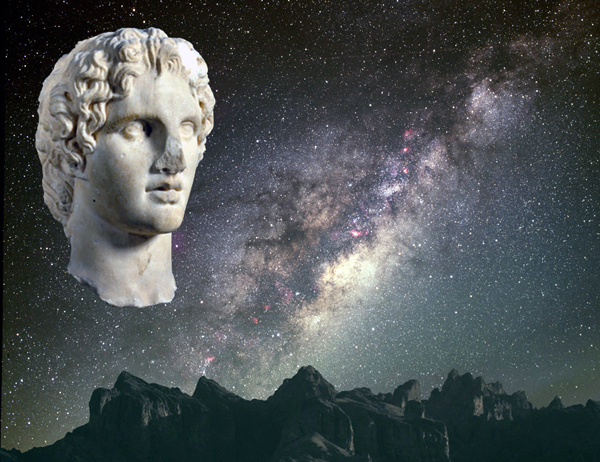Iskander, Khan Tengri
Wednesday, April 18th, 2007
“I’ve seen things you people wouldn’t believe.
Attack ships on fire off the shoulder of Orion.”
Roy Batty, in Blade Runner
In my college junior year, I took two semesters of archeology. Anti-diffusionism was the correct stance in the discipline back then. According to this doctrine, every new thought, every invention arose locally and independently. To say otherwise smacked of cultural imperialism.
Being a lifelong contrary, in my term paper for the first semester I described how Alexander the Great spread Greek culture and language from Siwah to Samarkand (the professors were good sports — they gave me an A). The local cultures were transformed by this influence and in turn transmuted it into such pinnacles as the Gandharan Graeco-Buddhist sculptures and Aristarchus’ heliocentric universe. Alexander’s achievements stayed indelibly in my memory. Having left my own culture, I also sympathized with the double vision he acquired as he observed other ways of living and thinking.
So I was curious to find out how Oliver Stone would handle a figure that fiction editors would reject as entirely unrealistic, except perhaps in superhero cartoons. After I saw the film (and even more so after I saw Revisited, its final version) I was puzzled by the spate of poisonous reviews it received, especially when compared to such clunkers as Troy, Apocalypto and 300. Granted, it was uneven, self-conscious, as subtle as a club and adolescently coy about Alexander’s bisexuality, a norm for most aristocratic warrior cultures throughout history. It also gave absurdly contemporary motivations — coupled with tone-deaf dialogue — to people who would have scoffed at Freud and recovery programs.
Yet the film had two unusual features that turned it into “something rich and strange”. One was its relative accuracy (with the glaring exception of the Hydaspes battle which Alexander won, as he did all his battles). But Stone got something else unexpectedly right: the ineffable yearning that distinguished Alexander from all other so-called conquerors.
There were two scenes in particular that gave me the unmistakable frisson of a brush with a fundamental. One came when Alexander stood at a Hindu Kush pass looking down on an endless sea of glittering snowy peaks, gazing east towards Mongolia and China — lands that were then known, if at all, as fables. The other came when the Sogdian women were whirling before him on dark red rugs, part Hindu apsaras, part Altaic shamans. The details of the dance were undoubtedly incorrect. Yet it plucked a deep chord, this visual shorthand of the new paths opened by Alexander’s passing, like the filaments of a nebula created by a nova explosion.
Alexander was one of T. E. Lawrence’s “dreamers of the day”. He had the charisma and great appetites of the extravagantly gifted. At heart he was an avid explorer who wanted to reach the end of the world. As an Iron Age king with an army, he pursued his quest conventionally, by engaging a convenient enemy. Yet he kept no plunder for himself, brought a bevy of scientists wherever he went, and was so receptive to the cultures he encountered that he angered his Macedonians, who preferred the rape-and-pillage approach. Characteristically, a sudden longing prompted his marriage to Roxanne and he wanted to leave not a dynasty but an immortal legacy.
With his ardent wish to excel, his denial of limitations, his thirst to know what was beyond the horizon, Alexander was the quintessential Westerner: ever seeking, never satisfied. No wonder his men rebelled when his goals exceeded their fixed mental boundaries, despite the marvels that they got to see because of his insatiable roaming. It is ironic that he went east, into cultures that were not only immobilized by their sophistication but also less defiant than the one which imbued him with the values that determined his trajectory.
It would be a cliché to conclude that hubris was Alexander’s nemesis. Stone identifies the real culprit by having Ptolemy say, “The dreamers exhaust us. They must die before they kill us with their blasted dreams.” Alexander’s killers were the increasing loneliness that engulfs a visionary who has the wrong context for his vision; the sense of failure that eventually overwhelms a romantic who can never achieve enough; and the uncritical adoration and hatred that focus like laser beams on extraordinary people, leading to loss of perspective and extremes.
Alexander was a brilliant strategist, a phenomenally brave warrior, a magnetic leader who led by example. He also seemed profoundly aware that the world held endless wonders and possibilities. The universe was his true home. And the universe is too vast and lonely, unless you have like-minded companions on the journey to keep you sane. Had Alexander lived and gone west as he intended, he would have fitted well among the fierce, demon-ridden Celts and Norse who understood larger-than-life figures. I see him crossing the Atlantic, taking an Iroquois mate and following the sun — to the Plains people, whose vision quests were kin to his own; to Japan, perhaps already obsessed with notions of honor as Homeric as his.
In Greek lore, Alexander’s sister turned into a mermaid when she heard of his death. She got hold of ships and asked their crews, “Does Alexander live?” Wise sailors replied in the affirmative. Within ten years Alexander changed the world in ways that still reverberate today. By trying to live like a legend, he became one — the exemplar of the human spirit that bursts through its perishable frame as it reaches for the ever-beyond: our blessing and our curse.
——-
Iskander (Persian): Alexander
Khan Tengri (Uighur): Lord of the Skies; also the name of the most impressive peak of the Tengri Tagh (Tien Shan) range, the farthest northeastern point that Alexander reached.

Art images: Skymountain courtesy of NASA archives
Bust of Alexander by Leochares (Acropolis Museum)
High Caucasus photo by Vladimir Kobilov


 The Repercussions of Planetary Settlement
The Repercussions of Planetary Settlement The Repercussions of Planetary Settlement
The Repercussions of Planetary Settlement